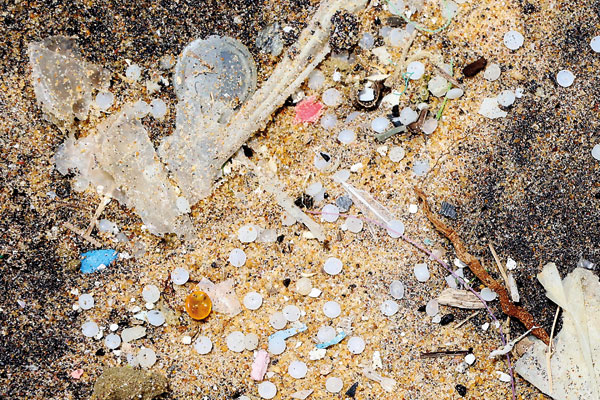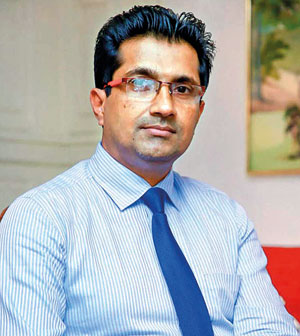News
Mannar’s ‘plastic beaches’ a sinister sign of transboundary pollution
View(s):By Tharushi Weerasinghe
With the southwest monsoon in full swing, the shores of Mannar are once again buried under waves of transboundary plastic pollution, this year, locals say, worse than ever.
“When we go out to sea, the southern coast leading to Adam’s Bridge is covered,” said Selvaratnam Dilaxan, a social and environmental activist from Mannar. “There’s plastic dust in the air, too, brought by the winds. We usually get a lot of it, but this time it is intense.” Locals speculated that the trash is coming in from India, though there is no official data or research at the moment to confirm this. “But everything is ending up here, and it is having extremely bad impacts on our ecosystems.” Mr. Dilaxan also noted that, in the absence of official studies, the impact of plastic pollution at this scale on groundwater and fish — the community’s primary sources of income and sustenance — remains unknown, though it is likely causing severe, yet undiscovered, health consequences.

Plastic pellets washed ashore in Mannar
While the Marine Environment Protection Authority (MEPA) has been conducting regular cleanups to remove plastic pellets or “nurdles,” Dilaxan noted that the finer plastic dust, dispersed by the monsoon winds, is far more difficult to collect, leaving the community struggling with a problem that worsens each season.
This is not a new problem, said Prof. Terney Pradeep Kumara, Director General of the Department of Coastal Conservation and Coastal Resource Management. But he added that there is no reliable data on the plastic “dust”. “I can’t confirm it unless appropriate sampling is done and studied.” But he acknowledged that monsoon currents usually push debris toward Sri Lanka – “but during the rains, some of it also washes away,” he explained.
He noted that regional litter management frameworks such as SACEP and SAS, once developed to coordinate efforts, have largely fallen into disuse. “As long as countries don’t resolve their internal waste management issues, plastics will keep circulating through ocean currents,” Prof. Kumara said. “Data shows we receive plastics from across South and Southeast Asia, but our plastics also travel to the Maldives, so we are part of the problem too.” He stressed that the Global Plastics Treaty, the sixth round of negotiations for which collapsed last week, is vital, as it would place greater responsibility on wealthier plastic-producing nations.

Prof. Terney Pradeep Kumara
Despite local efforts such as reducing single-use plastics, conducting plastic audits with fishermen, and promoting larger reusable containers, many initiatives falter during implementation. “Plastic is no one’s baby,” he added. “Regulations exist, but without proper control mechanisms, they aren’t effective. Like the tax system, we need a well-established, accountable structure. New technology without the right policies and action is pointless.”
Minister of Environment Dr. Dammika Patabendi said the surge in plastic debris was first observed after two major ship incidents. “Plastic trash started to come after the two ships went under — both caught on fire, one drowned, and the other was dragged to international waters,” he said. “The western shores started seeing a lot of trash. We spoke to the Indian Coast Guard and the shipping company. They have agreed to pay damages and compensation, and the Attorney General’s Department is advising us accordingly. MEPA is coordinating cleanups with support from local authorities in Mannar and Jaffna.”
With the monsoon currents, Dr. Patabendi noted, the lingering effects of the MV X-Press Pearl disaster may be resurfacing, compounded by newer shipwrecks. “The MEPA Act has to be amended, and we are in the process of doing that,” he said.
On the international front, he acknowledged slow progress on the Global Plastics Treaty. “There were five negotiation rounds, with the last in April this year in Kenya, but we couldn’t reach an agreement. The follow-up session in Geneva also failed. The next step is still being decided,” he said. “There are two key divisions — whether the full life cycle of plastic, starting from production, should be covered, and whether the health implications, like the endocrine-disrupting chemicals in plastics, should be part of the framework. Petroleum-producing countries oppose these measures. Island states like us, compared to producers and users, face the brunt of plastic pollution, so we are pushing for the full cycle to be included. The High Ambition Coalition supports this, too.”
He added that the Environment Act has been amended and approved by Cabinet, introducing Extended Producer Responsibility (EPR) and bans on certain single-use plastics, alongside an action plan focused on the “three Rs” — reduce, reuse, and recycle. “Plastic pollution is a global crisis, and as a non-producing island nation, we cannot solve it alone,” Dr. Patabendi said. “This is bigger than international borders. MEPA and the other 12 authorities under the ministry have been under-resourced for years, with little capacity building. After the X-Press Pearl disaster, they should have been strengthened; that work is now underway, alongside the necessary legal amendments.”
The best way to say that you found the home of your dreams is by finding it on Hitad.lk. We have listings for apartments for sale or rent in Sri Lanka, no matter what locale you're looking for! Whether you live in Colombo, Galle, Kandy, Matara, Jaffna and more - we've got them all!

